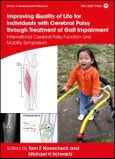This book is based on presentations and discussions of a group of world-renowned experts during a symposium “International Cerebral Palsy Function & Mobility Symposium: Improving Quality of Life for Individuals with Cerebral Palsy through Treatment of Gait Impairment” which was held in Banff, Canada, in December 2019. Clinicians and scientists are paired to discuss the current state of knowledge, working at the border of what we know and what we don’t, to advance the care of those with gait impairment due to cerebral palsy. Using authors with different focus, points of view, and ways of thinking, to help establish a framework to guide research efforts for the next five years and to ensure that progress continues to be made to improve the quality of life for those with gait impairments. Disparate topics are unified by a common format of bulleted key points and objectives at the beginning of each chapter and research goals at the end to make the results more rapidly accessible.
- Focus on gait and mobility in a clear, well-structured format.
- Enhances debate and exploration of issues.
- Challenges long-held assumptions to explore the current state of research, testing, and treatment and help direct it meaningfully.
- The disparate topics are unified by a common format of bulleted key points and objectives at the beginning of each chapter and research goals at the end to make the results more rapidly accessible.
- Presents objective, but also expert opinion, on how future research could be best directed.
- Patient goals need more attention, outcomes have stagnated, the details of the underlying neurological impairments are still a mystery, and strong evidence for what we do is desperately needed.
Table of Contents
Author Appointments
Preface
Acknowledgements
1. Lever Arm Dysfunction: Improving Care Requires Greater Knowledge of Early Development and Long-term Consequences
Andrew G Georgiadis and Katherine M Steele
2. Accuracy in the Operating Room: Dialogue Between a Biomedical Engineer and an Orthopaedic Surgeon
Moran Sangeux and Thomas Dreher
3. Outcome Measurement in Ambulatory Cerebral Palsy
Benjamin Shore, Kaat Desloovere, and Unni G Narayanan
4. Definitions and Measurements of Spasticity and Dystonia: Pathways to Solve a Babylonian Confusion
Kaat Desloovere and Warren A Marks
5. Spasticity and Dystonia: Consequences, Management and Future Perspectives
Kristina Tedroff and Marjolein van der Krogt
6. Motor Control: Missing Links Between Neurologic Injury and Movement that Limit Care and Function
Warren A Marks and Katherine M Steele
7. The Muscle-Tendon Unit in Children With Cerebral Palsy
Rick Lieber and Tim Theologis
8. Pathomorphology of Skeletal Muscle in Cerebral Palsy: Current State and New Directions
Jason J Howard, H Kerr Graham, and Adam P Shortland
9. Treatment of Muscle Tendon Unit Dysfunction in Children with Cerebral Palsy: Historical Overview, Current Practices and Impact of Physics-based Modeling
Jon R Davids, Anahid Ebrahimi and Darryl G Thelen
Afterword
Index








